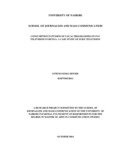| dc.description.abstract | Liberalisation of airwaves and proliferation of broadcasting stations has led to
increased competition in Kenyas’ broadcast industry (Oriare et al., 2010). In the pay
television sector, stiff competition was witnessed with the entry of Wananchi Group
having a brand name Zuku in 2009 (Kenya Film Commission 2010).This study was
focused on the pay television broadcast sector in Kenya with Zuku as a service
provider. The overall objective of the study was to establish consumption patterns of
local content on Zuku television by subscribers. Specific objectives included to
establish factors determining uptake of local Zuku content, establish subscribers’
perception of local content in terms of quality and story line, and establish responses
of the service provider towards consumption patterns. The target population for this
study was all Zuku subscribers in Nairobi.
The study used primary data, which was collected using open-ended interviews and
questionnaires and structured interviews with key informants. Secondary data sources
were also consulted for more information. Data was presented by use of tables and
figures. The study established that most Zuku subscribers were aware of all local
programmes on its platform. It was further established that although local
programmes awareness was high, consistency in viewership was poor. State House
was established the most favourite local programme on Zuku platform because of its
ability to connect with the viewership in terms of movie settings, fiction and drama,
while Groove Theory was found to have the best video quality and Leo to have the
best audio quality. Consistency of high viewership was found among subscribers of
25 to 30 years. Local programmes on Zuku were found to be family oriented hence
people consumed them in a family setting. It was established that viewership of local
programmes was concentrated on weekends more than weekdays among Zuku
subscribers. The study recommended that Zuku needs to telecast fresh episodes of
local programmes on weekends and slot repeats during weekdays. This study also
recommended that Zuku needs to increase promotion of local content on its platform
to increase awareness across all subscribers and come up with block and encounter
programming strategies in order to retain and attract local content audience. | en_US |

